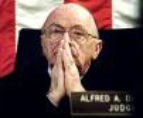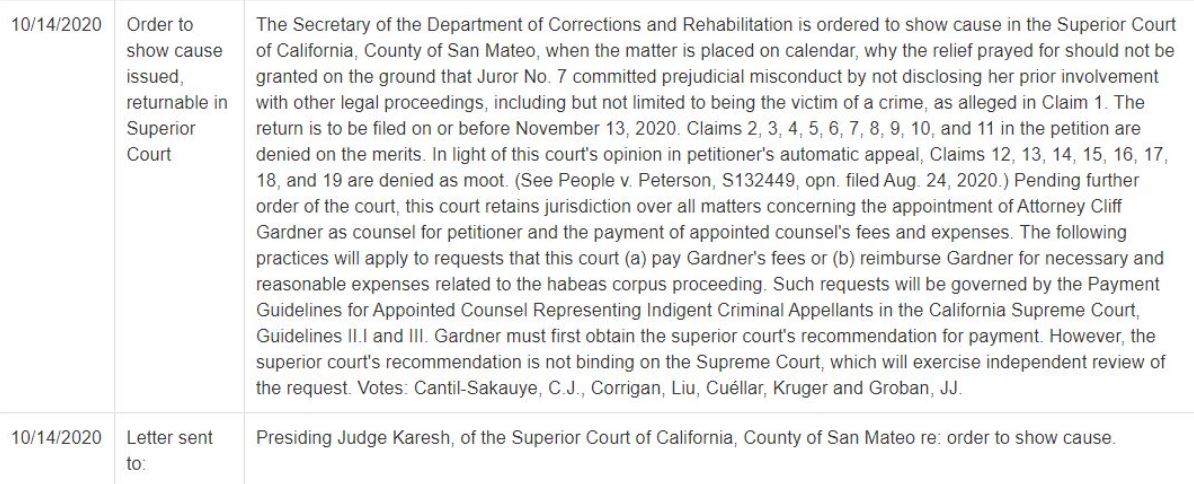Appeal Information

With all the issues that have been raised in this case, if there is a conviction in this case, it will be an appellate lawyer's petri dish.
Judge Alfred Delucchi, October 29, 2004, The trial of Scott Peterson
Judge Alfred Delucchi, October 29, 2004, The trial of Scott Peterson
On March 16, 2005, Judge Delucchi sentenced Scott Peterson to death for the murders of his wife, Laci, and unborn son, Conner. The next day he was transferred to California’s Death Row at San Quentin State Prison.
All defendants that are found guilty are entitled to a Direct Appeal with a state appointed attorney. A Direct Appeal addresses errors that occurred in the court room. If the Direct Appeal is denied, a defendant can file a Petition for Writ of Habeas Corpus, which allows new information outside the court record to be presented to the court. While all defendants that are found guilty are also allowed to file this type of Petition, only a capital defendant will be given state appointed representation to do so. (This is why you typically do not see a capital defendant represented by an innocence project in California—innocence organizations generally represent people who have completed their Direct Appeal and do not have legal representation for a Petition—capital defendants in California have legal representation provided in both state and federal court.) In a capital case, both the Direct Appeal and a Petition for Writ of Habeas Corpus are filed directly with the California Supreme Court.
The appellate documents that have been filed in Scott’s case are available below.
All defendants that are found guilty are entitled to a Direct Appeal with a state appointed attorney. A Direct Appeal addresses errors that occurred in the court room. If the Direct Appeal is denied, a defendant can file a Petition for Writ of Habeas Corpus, which allows new information outside the court record to be presented to the court. While all defendants that are found guilty are also allowed to file this type of Petition, only a capital defendant will be given state appointed representation to do so. (This is why you typically do not see a capital defendant represented by an innocence project in California—innocence organizations generally represent people who have completed their Direct Appeal and do not have legal representation for a Petition—capital defendants in California have legal representation provided in both state and federal court.) In a capital case, both the Direct Appeal and a Petition for Writ of Habeas Corpus are filed directly with the California Supreme Court.
The appellate documents that have been filed in Scott’s case are available below.
DIRECT APPEAL
On January 7, 2009, the state of California appointed Cliff Gardner to represent Scott for his Direct Appeal. The briefing, oral arguments, and the California Supreme Court Opinion are available below.
On July 5, 2012, Scott’s attorneys filed the Appellant’s Opening Brief. The Appeal raised sixteen issues: ten issues that could overturn the guilty verdict and six issues that could overturn the death sentence (but not the guilty verdict).
On January 26, 2015, the Attorney General of California filed the Respondent’s Brief.
On July 23, 2015, Scott’s attorneys filed the Appellant’s Reply Brief.
On June 2, 2020, Cliff Gardner argued on behalf of Scott before the California Supreme Court.
On August 24, 2020, the Supreme Court of California issued its opinion. They upheld the guilty verdict but overturned Scott’s death sentence due to an error made by Judge Delucchi during jury selection.
On January 15, 2021, Cliff Gardner filed a Petition for a Writ of Certiorari in the Supreme Court of the United States. The Petition argued that the error made by Judge Delucchi during jury selection should also overturn the guilty verdict in Scott’s case. The Supreme Court denied the request to hear the case on February 2, 2022. (Scott still has appellate options available to him in federal court after his claims are exhausted in California.)
When the Supreme Court of California overturned Scott's death sentence, the District Attorney of Stanislaus County started proceedings to put Scott back on death row. However, after months of proceedings, the District Attorney decided not to pursue a death sentence. On December 9, 2021, almost seventeen years after the jury reached its verdict of death, Scott was re-sentenced to life in prison without the possibility of parole.
PETITION FOR WRIT OF HABEAS CORPUS (Petition 1)
On February 18, 2010, the state of California appointed Larry Gibbs to represent Scott for his habeas proceedings. The petition, briefing, and court rulings are available below.
On November 24, 2015, prior to the court’s decision on Scott’s Direct Appeal, Larry Gibbs filed Scott’s first Petition for Writ of Habeas Corpus. This petition raised nineteen issues: eleven asking the court to reconsider Scott’s guilty verdict and eight asking the court to reconsider Scott’s death sentence.
On August 10, 2017, the Attorney General filed their Informal Response.
On August 7, 2018, Scott’s attorneys filed their Reply. (Larry Gibbs had retired in 2017, so this reply was filed by Cliff Gardner’s office and the Habeas Corpus Resource Center.)
On October 14, 2020, just seven weeks after Scott’s death sentence was overturned, the Supreme Court of California issued an Order to Show Cause. Scott’s Petition had met the burden to show that “Juror No. 7 committed prejudicial misconduct by not disclosing her prior involvement with other legal proceedings, including but not limited to being the victim of a crime, as alleged in Claim 1.” This ruling was an order for the state to respond to the claim. The Supreme Court sent the matter to the Superior Court in San Mateo County where Scott’s trial was held. Judge Massullo was pointed to oversee all matters.
On December 10, 2020, the District Attorney of Stanislaus County filed their Return, as ordered by the court, denying that there had been prejudicial juror misconduct.
On December 20, 2022, after over two years of briefing, COVID delays, and an evidentiary hearing into juror misconduct, Judge Massullo denied relief. After reviewing proposed orders from both parties, Judge Massullo found that while there was juror misconduct by Juror No. 7, the conduct was not prejudicial. At this point, Scott had no further pending claims before the court.
PETITION FOR WRIT OF HABEAS CORPUS (Petition 2)
Once Scott was denied a new trial in December of 2022, he had 120 days to file any subsequent claims. However, his state-appointed lawyers could not present any new claims on Scott’s behalf as he was no longer a capital defendant. Scott would need to hire a new lawyer or present new claims “pro se” (representing himself).
On April 19, 2023, not having the time or resources to hire an attorney, Scott filed his second Petition for Writ of Habeas Corpus. This petition raised six issues, including exonerating new evidence from two witnesses who recently heard someone confess to seeing Laci on December 24, 2002, during the burglary across the street from Scott and Laci’s house. The Court of Appeal could have denied Scott's pro se petition, but within eight days of filing, on April 27, 2023, the Court of Appeal requested that the Office of the Attorney General file an opposition in response to all issues raised in the petition. In this petition, Scott asked the state of California to appoint him an attorney, and in August of 2023, the court-appointed Correen Ferrentino to represent Scott. In November of 2023, the Los Angeles Innocence Project substituted in as counsel of record in place of Correen Ferrentino. This second petition and briefing are available below. This petition is still in the briefing stages in the California Court of Appeals. You can review the docket at 1st District Court of Appeal.
On July 31, 2023, the Attorney General filed their Informal Response.
POST-CONVICTION DNA AND DISCOVERY MOTIONS
On January 17, 2024, the Los Angeles Innocence Project (“LAIP”) filed three motions on Scott’s behalf in the Superior Court of San Mateo County. They filed a Motion for DNA Testing per Penal Code §1405. This motion seeks testing of items that “raise a reasonable probability that a verdict or sentence would have been more favorable to the defendant if the results of the DNA testing had been available at the time of conviction.” They also filed a Motion for Post-Conviction Discovery per Penal Code §1054.9 which seeks materials in the possession of the prosecution and law enforcement that Scott was entitled to at the time of trial. This motion is requesting copies of reports, documents, audio tapes, video tapes, and photographs that LAIP, after good faith efforts, has been unsuccessful in locating. The third and final motion was a Motion to Seal selected last names that were contained in a 54-page letter that LAIP sent to the District Attorney of Stanislaus County in November of 2023. The exhibit was withdrawn, so that motion is not posted.
On April 22, 2024, the District Attorney of Stanislaus County filed their formal Opposition and opposed all DNA testing. A copy of their Opposition is available from the clerk of the Superior Court of San Mateo County. Then, on May 6, 2024, LAIP filed its Reply to the Opposition. There is a court date for the DNA Motion on May 29, 2024 at 9:00 a.m. PST.
